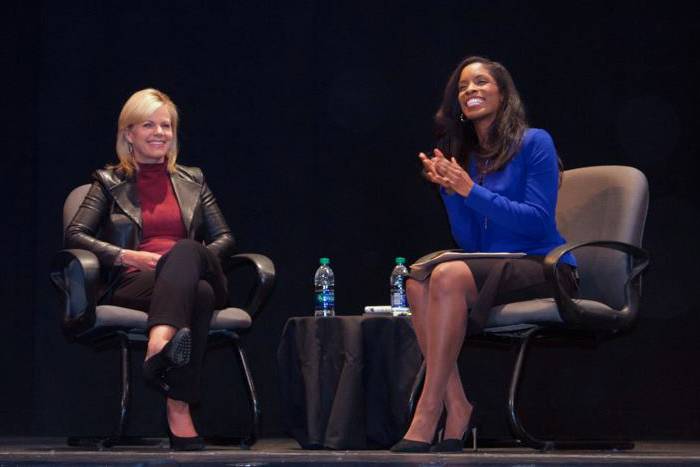On Her 'Be Fierce' Tour, Gretchen Carlson Offers Action Plan for Fighting Sexual Harassment

In July 2016, former Fox News anchor Gretchen Carlson filed a sexual harassment lawsuit against ex-CEO Roger Ailes. Since then, she has stood at the forefront of gender equality and efforts to raise awareness for victims of sexual assault in the workplace.
As part of her ongoing Be Fierce tour, she emphasized the importance of allowing women to be heard during a talk Thursday evening at Page Auditorium. The talk was sponsored by the Duke Women's Center, which is celebrating its 30th anniversary on campus.
“Around harassment and assault in the workplace, there are two ways in which cases are typically resolved, and they both silence women,” Carlson said. “The first is a settlement. The other way which companies predominantly choose to handle this situation is through an arbitration clause in employment contracts.”
Taking an anti-arbitration clause stance, Carlson highlighted how arbitration clauses, which are often hidden or not fully understood, eliminate sexual harassment victims of their seventh amendment right to go to an open jury process.
However, through her personal experiences, she recognized that often it’s not just the legal system which can hurt victims, but also the social stigma of sexual assault. She highlighted how gender inequalities prevent women from having their experiences validated.
“First and foremost, you’re not believed. Secondarily, you’re called a troublemaker. And what I have come to find out is, you can have on hospital scrubs, or military gear, or a skirt. It doesn’t really matter. It’s not your fault.”
Carlson replies to everyone who reaches out to her with a story and provides solidarity, empathy and support. She has also created a foundation for women who need resources to reach out to media or to file lawsuits.
“For the most part, we’re only telling stories of well-known famous people, and so talking a lot about Hollywood and the world of journalism and Capitol Hill. It’s my greatest hope that the everyday woman’s story will also be told because I know those stories exist,” Carlson said.
She provided a list of actions for victims to follow, urging them to hire a lawyer, record the evidence and share their stories with trusted friends. With legal counsel, documentation, and witnesses, victims have the strongest case and the biggest potential to accomplish social change.
Esther Badiata, an undergraduate junior, spoke about the importance of action. “I was inspired by not only how she cares, but she provides an action plan. I think we can tell by history and current events that next steps are what we need.”
Sophomore Shreya Gunapati talked about how Carlson’s perspective was helpful for victims contextualizing sexual harassment. “With the recent events gaining speed, having a professional perspective is really significant. Not only did she experience this personally, but she can talk about her story in a workplace.”
Carlson ended the talk by identifying harassment as a problem that affects both men and women, calling everyone to action. She called for a safe space for women to speak out and advocate for these issues; however, she also placed responsibility on men to step up and defend women.
“This is really a man’s issue, and it shouldn’t be on the shoulders of women to solve it,” she stated. “As long as 94 percent of Fortune 500 companies are run by men, we need men to help us, not only in battling sexual harassment but in hiring more women in higher positions and paying us fairly.”